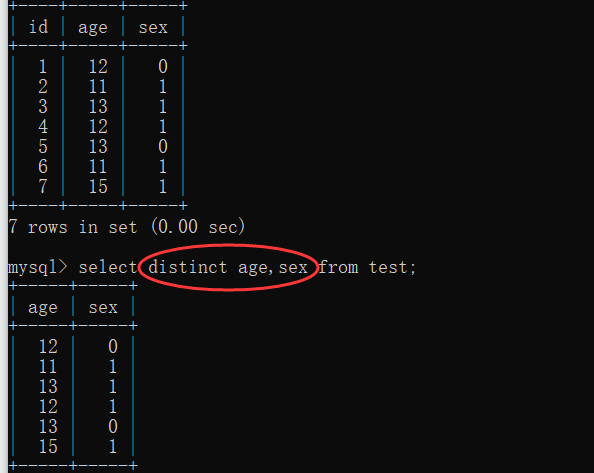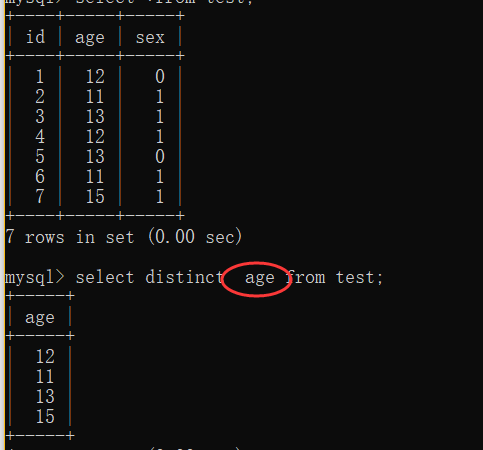数据库表的查询基本操作
DQL(Data Query Language): 查询操作。
一.单表查询:
一.普通查询
--查询student表中的所有数据
select *from student
--查询student表中指定字段
select id, name from student
--查询student表中指定数据
select id,name from student where id=2 ;
select id,name from student where age=18 and sex="famale" ;
二.模糊查询

1、% 替代一个或多个字符
2、_ 仅替代一个字符
3、[charlist] 字符列中的任何单一字符
--查询以住在以'Ne'开始城市的人
select *from persons where City like 'Ne%' ;
--查询居住在包含on城市的人
select *from persons where City like '%on%' ;
--查询城市第一个字符后为'dodon'的城市
select *from persons where City like '_ondon'l;
--查询居住的城市以 "A" 或 "L" 或 "N" 开头的人:
select *from persons where City like '[ALN]%' ;
三:distinct去重
--去除age中相同的数据
select distinct age from student;
--去除age和sex都相同的数据
select distinct age,sex from student;

四.limit子句
--检索前4行数据 显示id=1,2,3,4的数据
select *from test limit 0,3;
select *from test limit 3;
-- 检索3行数据 显示id=4,5,6的数据
select *from test limit 3,5;
五.group by 和having子句:
--按sex分组 统计人数并显示sex个数
select count(*) from group by sex;
--按sex分组 统计人数并显示sex个数和具体的sex
select sex,count(*) from group by sex;
where,having,和group by联合使用
在最初学习group by的时候,我就陷入了一个误区,那就是group by不能和where一起使用,只能用having……
其实它们都是可以一起使用的,只不过是where只能在group by 的前面,having只能在group by 的后面。
滤清执行顺序:①先对*进行筛选,②对筛选的结果进行分组,③对分组的结果进行筛选
--30100学院的每个专业的学生有多少人。
select majar, count(*) from student where college = 30100 group by majar ;
--查询每个学院的学生有多少人,并且只要学生人数大于3的。
select college,count(*) from student group by college having count(*) >3 ;
六.order by子句
--student表中id按逆序排列 id=5,4,3,2,1
select *from student order by id desc
--student表中id按顺序排列 id=1,2,3,4,5
select *from student order by id asc
--student表中按字母(是英语非中文)顺序显示名称
select *from student order by name asc;
七:聚合函数(常用六个)
--count(*) 统计个数
select count(*) from student;
--和count(*)一样统计个数,但是不同的是它除去age中为null的行数
select count(age) from student;
--将age中数值相加
select sum(age) from student;
--将age中数值相加求平均值
select avg(age) from student;
--求age中最大值
select MAX(age) from student;
--将age中最小值
select MIN(age) from student;二.多表查询:
1. 连接查询(交叉连接,内连接,左外连接,右外连接)
- 交叉连接(笛卡尔积原理)
--student表全部内容和mark表全部内容生成笛卡儿积
select *from student,mark;
--student表id,name和mark表grade生成笛卡儿积
select student.id ,studen.name ,mark.grade from student ,mark;
- 内连接:用的最多
--student表内连接mark表查看student的id,student的name,mark的grade当满足mark.stu_id=student.id;
select student.id ,student.name ,mark.grade from student inner join mark on mark.stu_id=student.id where ...条件 ;
<=>select student.id ,student.name ,mark.grade from student inner join mark where mark.stu_id=student.id;
<=> select student.id ,student.name ,mark.grade from student ,mark where mark.stu_id=student.id;- 左外连接:优先显示左表全部记录 ,保留左边的记录,相比内连接可以匹配右边的null
insert student.id ,student.name,mark.grade from student left join mark on studen.id=mark.stu_id;- 右外连接: 优先显示右表全部记录 ,保留右边的记录,相比内连接可以匹配左边的null
insert student.id ,student.name,mark.grade from student right join mark on studen.id=mark.stu_id;2. 联合查询:取的列数数量一致
//将name和grade放同一列
select name from student union all select grade from mark;
//将name和grade放同一列,将student的id和mark表中的id放同一列
//select name,id from student union all select grade,id from mark;
3. 嵌套查询(子查询)
--从mark表中获取id号,根据该id号用来查询student中的数据
select *from student where id in (select stu_id from mark);
最后
以上就是飞快电话最近收集整理的关于mysql学习笔记(五) 数据库表的查询基本操作数据库表的查询基本操作二.多表查询:的全部内容,更多相关mysql学习笔记(五)内容请搜索靠谱客的其他文章。
本图文内容来源于网友提供,作为学习参考使用,或来自网络收集整理,版权属于原作者所有。








发表评论 取消回复